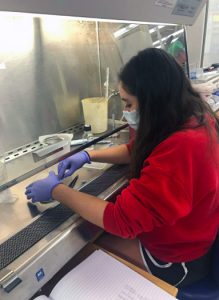Creating a Southern Soil Health Course
By Shelby Kaplan, OFRF Research and Education Intern
She recently graduated from University of Wisconsin Madison with a degree in plant pathology and a minor in food systems. She will continue her studies in the fall at ASU to receive a graduate certificate in food policy and sustainable leadership.
As an OFRF intern this summer, I have been working with Thelma Velez, the Research and Education Program Manager, to create a free soil health course titled, Soil Health Strategies for the Southern Region. This course builds on a recent OFRF publication, Building Healthy Living Soils for Successful Organic Farming in the Southern Region, and describes challenges in Southern soil health and ways to mitigate these problems in a sustainable way.
 Personally, the course is thought-provoking and provides a way for me to learn more about organic farming practices. I have an interest in sustainable agriculture and am eager to learn more about the organic farming space, while also hoping to help farmers improve their practices with science-based information. Although the Midwest environment where I went to college differs quite a lot from Southern ecosystems, I have travelled abroad several times in order to broaden my knowledge of organic agriculture in other regions.
Personally, the course is thought-provoking and provides a way for me to learn more about organic farming practices. I have an interest in sustainable agriculture and am eager to learn more about the organic farming space, while also hoping to help farmers improve their practices with science-based information. Although the Midwest environment where I went to college differs quite a lot from Southern ecosystems, I have travelled abroad several times in order to broaden my knowledge of organic agriculture in other regions.
The goal of the course is to assist organic farmers in the South and show practical strategies to help improve their crops by improving the soil, which will build resilient farms. Healthy soil is the basis for successful farming, so finding ways to better manage it and improve on the practices already in place is critical. As the climate continues to change and put increased pressure on farmers, there needs to be an even greater focus on ways to improve the capabilities of soil and the ways we use it.
Supporting organic farmers by providing up-to-date information is an important step in improving organic systems and our environment. Helping to create this course has taught me more about organic systems in the Southern environment, their challenges, as well as possible solutions.
I hope to continue supporting the organic farming community through working with OFRF in other ways in the future!


